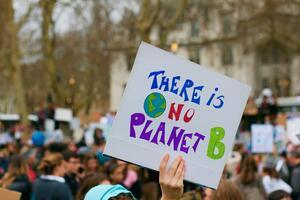Recollections of a Relentless Teen Climate Activist
Protester Holding Sign, "There is No Planet B." Photo via Kevin_Snyman on Pixabay.
Tuesday, March 10, 2020. A day when the world was haphazardly going into systematic lockdown in response to the exponential spread of coronavirus. Americans were beginning to take heed of the international response. Conferences, festivals, spring break travel, even schools prepared to close.
But an email from the teenage leaders coordinating the national youth climate strike coalition assured its recipients that the convening of 75 youth activists from across the country would occur the following week, as scheduled. The impending global crisis could not eclipse the imperative to orchestrate three days of mass action on Earth Day 2020, to match the scale and political efficacy of the first Earth Day actions 50 years prior; to succeed, we needed our in-person meeting.
On Thursday, March 12, 2020, the leaders officially postponed the meeting, recognizing the reckless impossibility of holding such a convening amidst new pandemic developments. But on that Tuesday, our group clung, steadfast and stubborn, like true teenagers, to the conviction that our activism ceases for nothing. Really, we’re ride or die, and it's made clear in the email announcing the lack of changed plans:
There is risk. And it’s up to each of us to calculate for ourselves whether the risk outweighs the possibility. I don’t need to tell any of you this, the work we are doing is critical and time pressing. While we are watching the world and the media spiral in panic around COVID-19, I’m sure many of you share in the frustration that we are not responding this way to climate change. This movement cannot wait. It is our responsibility to keep momentum going despite what’s happening around the world. And to many, from feedback we have received from you, that is worth the risk as it stands now.
This is the difference in outlook and approach. Just as Americans at large began to embrace the idea of social limitations and mass shutdowns, youth activists remained hopeful of doing it our own way. I admit, this was before talks of flattening the curve and national social distancing—we understood the risk of meeting as a personal one, not communal; we would never jeopardize public health and safety after learning the broader fear of COVID-19’s power.
But, assessed outside the coronavirus crisis, as a microcosm for the perspectives of the youth climate movement, this email exemplifies our resolve to center movement over self. Sacrifice of normal behavior has become so ingrained into our mindset, perhaps even our psyche, that the leaders of our movement ask us to make a choice to risk our wellbeing for the sake of climate preservation.
The spirit of this email embodies the fire that fuels this movement I love, a fire of anger and sadness, of anxiety for the stability of natural wonders, of fear of tumultuous geopolitics resulting from climate change, of mourning for the loss of life imminent (and already occurring) in this crisis, for the loss of culture and community and peoples and generations. A fire that emboldens our iteration of American teenagers to challenge the very institutions on which our society operates and, while earnestly recognizing the burden of this request, propose that other young people choose morality over normalcy.
When you see us at our peak, when you walk beside us in the streets and when you hear the collective chants of thousands, of millions worldwide, you see the product of our activism, the exhilarating demand, the shining media opportunity, and you may likely admire this work. But you may not see the day to day rejection of normalcy that facilitates our transformation into youth activists of this moment.
In recent weeks, I have realized that my fears about the incomparable severity of the climate crisis and the urgent pull of the youth movement has distracted me from my other involvements. I ache to leave school during the week and work on weekends, to plow through my assignments, to avoid attending outside-of-school activities so I can send emails, write documents, participate in calls for the climate movement. On an average evening, I spend far more hours on climate organizing than homework.
This is the unintentional result of creating a movement, and I ask you to see it. The event or action you attend does not feature overtly the risks we took in haste, without over-cautiously weighing how our activism might disrupt our daily lives. Our profound sense of morality drives us to compromise our typical teenage obligations and aspirations, calling into question our conflicting responsibilities to a movement so grand in scope and consequence that our reverence of it gives its activities their tantalizing appeal, and our responsibilities to the commonplace expectations of classes, studying, casual parties and school functions, friends, work, even college plans. When we know the wellbeing of the world is in existential jeopardy, and we attempt to live to protect the future, we forget that we are still alive in the present. That we’re still just kids making our way.
Ultimately, I'm apologizing for being an American teenager. Just another kid navigating the liminal space between the idealism of adolescence and the pragmatic call of the real world. I do not know for how much longer my generation of activists and I will be able to afford the challenging pleasure of allowing morality to consume us, of seeing the world differently. But for the time remaining, I will continue with pride.
This piece was written as part of JWA’s Rising Voices Fellowship.








I am at the other end of the age scale being an 84 year old elder, and I share (and have always shared) since it seems forever, the frustrations and anguish you write of.
Don't despair, keep tight hold of your vision, and allow yourself the freedom to mature, peace and love always...... lyn ....